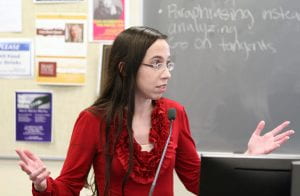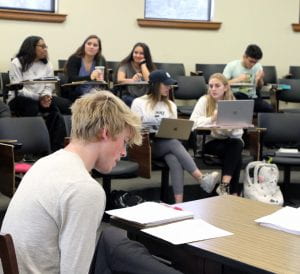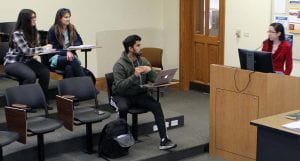By Sarah Hill
What do you do if you’re a university professor who depends on lecturing and interacting in class to help your students learn, but a speech impediment suddenly robs you of the ability to talk for any substantial length of time? That’s the dilemma faced by Baylor English professor Amanda Sigler, who is completing her first semester at the university.
Dr. Sigler, an assistant professor of English, has relied on faith and determination to achieve her goals despite her speech impediment. She was well into her academic career when she was diagnosed in 2015 with laryngopharyngeal reflux, a condition in which stomach acid damages the tissues in the voice box.
 “It is difficult for me to speak for long periods of time, and it often causes me to lose my voice,” Sigler said in an email interview. “It can be very painful, and if I push my voice too far I can spend half the night awake with a very sore throat.”
“It is difficult for me to speak for long periods of time, and it often causes me to lose my voice,” Sigler said in an email interview. “It can be very painful, and if I push my voice too far I can spend half the night awake with a very sore throat.”
Faced with the loss of her voice in most day-to-day interactions, Sigler had to make many adaptations to both her life and teaching style. In an essay she wrote for The Chronicle of Higher Education, she described how she changed her classroom routine while teaching English on the East Coast.
“During the period that followed (the onset of my condition), my pedagogy was transformed. Instead of lecturing solo, I delegated vocal responsibilities,” Sigler wrote. “I emailed my students — most of whom I had never met — to ask if they would be willing to serve as leaders in the classroom, reading my notes and discussion questions as I directed them. I assured them that everyone would get a chance to lead with me during the semester. Our class would become not only a writing seminar but also a public-speaking forum.”
Since she arrived at Baylor this fall, the University has provided Sigler with a microphone-equipped room so she can speak for a longer period of time without straining her voice. And she has continued to use a pedagogical model of co-leadership that includes her students in the teaching process.
 “Each day one of my students will sit next to me and read my notes and discussion questions aloud. This arrangement allows me to save my voice for more spontaneous interactions with the class,” she said, adding that this structure allows her students to develop strong leadership skills .
“Each day one of my students will sit next to me and read my notes and discussion questions aloud. This arrangement allows me to save my voice for more spontaneous interactions with the class,” she said, adding that this structure allows her students to develop strong leadership skills .
Sigler received a B.A. in English and German at the University of Tulsa, studying abroad in Austria for one semester. She then earned a Ph.D. in English at the University of Virginia and has taught at four schools since then, including UVA and James Madison University. At Baylor this semester, she is teaching two sections of ENG 2301, a survey of British literature.
“As a student, I was blessed by close mentoring relationships, and I benefitted from the intellectual generosity of my academic mentors,” Sigler said. Now, her goal is to pass on these gifts to her students and encourage them in their own pursuits.
“With God, anything is possible,” she said. “We can have faith in God’s plan, even if we don’t understand it.”
 Sigler believes that as Christians, we should recognize there are some things we can’t earn and are given to us as gifts.
Sigler believes that as Christians, we should recognize there are some things we can’t earn and are given to us as gifts.
“I’m particularly grateful for the opportunity to teach and do research at Baylor, a university with a strong Christian commitment and an ambitious academic agenda. I’ve been absolutely thrilled to work with the accomplished faculty and engaged students here,” Sigler said. Although her voice disability has been one of the biggest challenges of her life, she has learned to turn the challenges it presents into opportunities.
Catherine Foley, a Great Texts of the Western Tradition major in Sigler’s class, is grateful to her professor for exposing her to new texts she would never have read on her own.
 “She makes the most dull books interesting and shows us how these texts are still relevant today,” Foley said. “She will often pose a question at the beginning of the class, lead us through her thought process and answer it right at the end in true mic-drop fashion.”
“She makes the most dull books interesting and shows us how these texts are still relevant today,” Foley said. “She will often pose a question at the beginning of the class, lead us through her thought process and answer it right at the end in true mic-drop fashion.”
Foley sees the co-leadership aspect of the class as a complete benefit, giving her the opportunity to experience leading a classroom.
“My postgraduate plans are to pursue a Ph.D. and then hopefully teach at a university,” she said. “Through this co-leading, I’ve gotten to experience leading a classroom years before I normally would have.”
Foley said that she has learned to write in a more direct and straightforward way through Sigler’s “brilliant” analogies. This coming semester, Foley will work with Sigler, who serves as her advisor, on Foley’s honors thesis that researches cultural fairy tales.
Another current student of Sigler’s is Boozaziel Chavez, who also enjoys the co-leadership experience.
“A co-leader really does learn about what we are studying,” he said. “When you teach someone you know it better. Most people volunteer to co-lead the class a second time even though you are only required to do it once.”
Chavez, a senior biology major, is more science and mathematical-minded, and was worried going into the class about the required reading material.
“I voiced my concerns to Dr. Sigler, definitely. But going through her choice of literature has sparked an interest in me to read more,” Chavez said. “I’ve always communicated better through writing because English is my second language, and she recognized this. She helped me improve my structure and how to rephrase a couple of things, giving me tips. It flows better.”
Sigler has taught Chavez that there is no excuse for not following your passions, and she provides many opportunities for her students to grow as leaders and public speakers.
When asked where she sees herself in the future, Sigler responded, “Right here.”
————————
Sarah Hill is a senior professional writing and rhetoric major at Baylor.
Amanda Sigler’s essay “What It Means to Have a Voice” is available from The Chronicle of Higher Education.


Hi, Amanda. I was just reading your recommendation for my getting the Golden apple again. I still have it in our study on the book cabinet.
HOw are you doing? I was always impressed with your determination to do your very best. I’m sure that is still who you are. As an old 82 yr. old man, I work at keeping our trees and pool in shape. The Lord had continued to be very close to us, and we trust the same is true with you. God bless, my friend!
The key words are “olive fib”
It is I again. It just seems like you suffered from the exact malady I did. I can’t sing for more than one song and certainly couldn’t preach full-voice for a 30 min. sermon, let alone teach several hours. Looks like you have it all figured, out, and I rejoice with you for the way He is blessing you.
This is going to be a long weekend, so if you aren’t too busy, I would love to chat with you most any time. That’s the thing about being retired, we have 6 Saturdays and one Sunday every week. It is good seeing what you are up to, and it would do my old heart good to hear from you. 480-917-1172, most any time. We are in AZ, so at least one hour earler than you down deep in the Lone Star State! God bless and stay safe. Ol’ Dude Larry